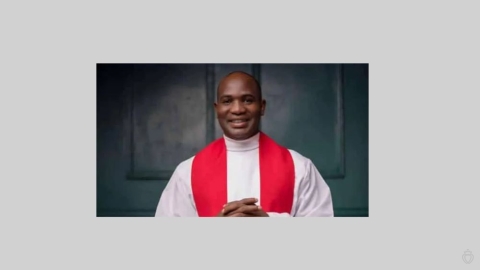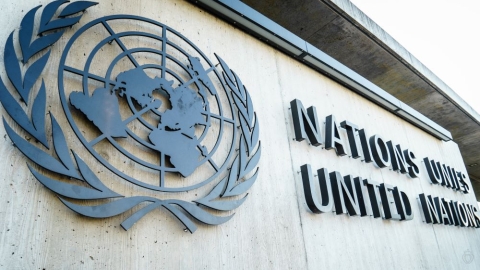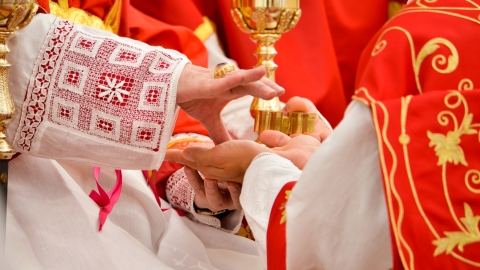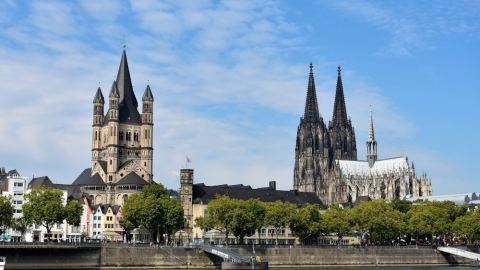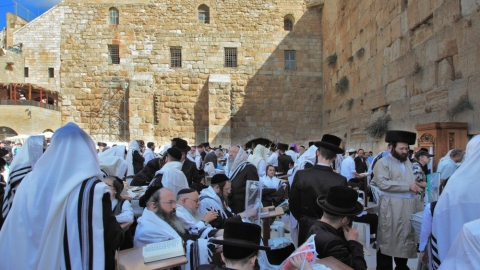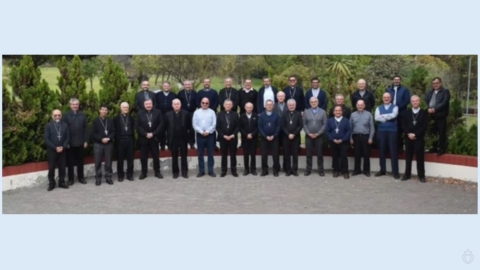The Synodal Path to a German National Church (9): Synod Statutes
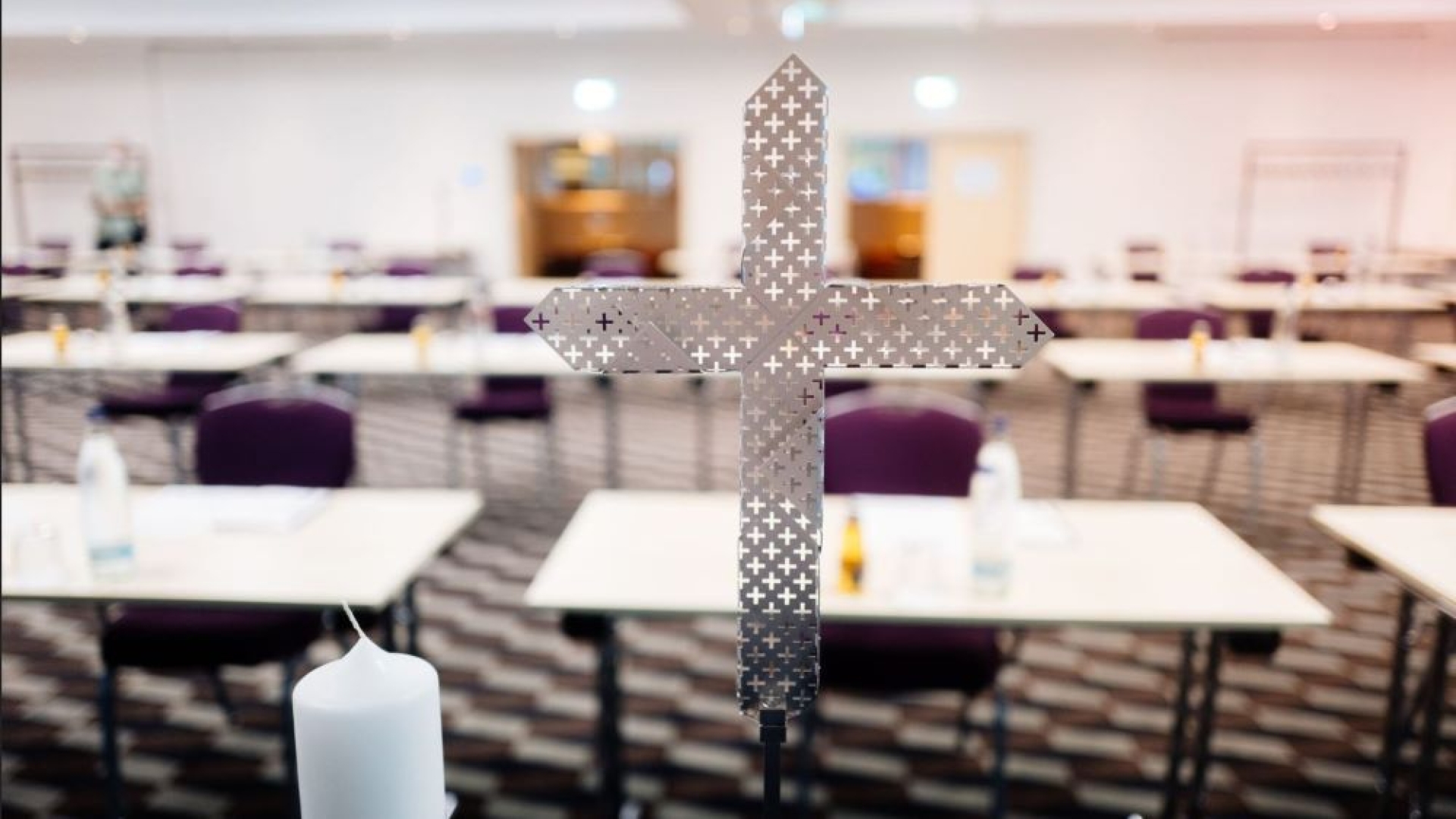
La croix du Chemin synodal allemand
The German Episcopal Conference (DBK) and the Central Committee of German Catholics (ZdK) began a “synodal path” on Sunday December 1, 2019. The previous articles have shown the revolutionary intention which animates the DBK supported by the ZdK. Pope Francis intervened on June 29, 2019 with a Letter to the Pilgrim People of God in Germany. The Curia has reacted in turn. But that has had no effect on the preparations for the event.
Taking advantage of the Curia’s reaction, two German bishops tried to change the strange direction taken by the synodal path, by proposing another method. They are Msgr. Rudolf Voderholzer, Bishop of Regensburg, and Cardinal Rainer Maria Woelki, Archbishop of Cologne.
A Rejected Counter Proposal
The two bishops, who had strongly opposed the synodal path shortly after its announcement, and taking advantage of Pope Francis’s Letter to the Pilgrim People of God in Germany, especially the criticisms by the Curia, reacted during the meeting of the DBK on August 19, 2019. Archbishop Rudolf Voderholzer criticized the preparation of this initiative and warned of the risk of falling “into the gutter of division” (Interview of September 15, 2019).
In the same interview, he explains that he understands the need for reform and the urgency of making a fresh start in faith: “A new orientation towards Christ—and that is the only meaning of “reform” from the biblical perspective—is always necessary.” But what is proposed from the perspective of the “synodal path” is “the abandonment of the Catholic profile and the abandonment of important elements in the Church.”
Archbishop Voderholzer added that with Cardinal Rainer Maria Woelki of Cologne, he had submitted to the permanent council of the German Episcopal Conference, at the August 19th meeting, a draft of alternative statutes which had been rejected by a majority of bishops. This project was inspired by Pope Francis’s norms and took into account all the criticisms of Cardinal Marc Ouellet, Prefect of the Congregation for Bishops, in his letter to Cardinal Reinhard Marx.
A few days later, the bishop of Regensburg, in a new statement, added that the thematic orientation of the “synodal path” did not grasp the reality of the crisis in Germany. The substance of the process under way is “dishonest” and “pseudo-scientific.” This is why he (as well as Cardinal Woelki) voted against the draft statutes, and why he is reserving the right “to withdraw completely, if necessary, after the first sessions.”
The Statutes of the Synodal Path
But these protests did not prevent the plenary meeting of the DBK, held in Fulda on September 25, 2019, from voting to approve, by a large majority, the statutes of the “synodal path.” These same statutes were finally approved by the ZdK Plenary Assembly on November 22, 2019, which finalized their acceptance.
The statutes have clearly not received Roman approval. Neither the DBK nor the ZdK mention it, and nowhere is it mentioned that this approval has been requested. The organizers, who play the transparency card, say nothing about it.
In addition, it is specified that these statutes were “definitively adopted” after the ZdK Plenary Assembly approved them. It is difficult to see Cardinal Marx then making an official request for approval to the Curia. Especially since the points of the project that are in dispute, so strongly criticized by the Curia, have not changed in any way.
But above all, to the minds of the protagonists of the synodal dynamic, such a sanction by the Roman authority is hardly necessary. Cardinal Marx explained it: the synodal path is a “sui generis process,” which must in no case be interpreted “through the prism of the instruments of canon law,” and which therefore does not require special authorization.
It is thus possible to measure the distance traveled since the joint Würzburg synod, from which this “synodal path” borrows so many elements. Back then, the German bishops asked for Roman approval, which they obtained. 50 years later, this is no longer the case.
Preamble
One of the only passages which has been somewhat rectified is the preamble to the statutes. The mention of the ZdK’s participation in the synodal path “provided that the opening of the consultation and the binding nature of the decisions are guaranteed,” (Protocol, page 1, no. 3) has been deleted.
On the other hand, this preamble points out Pope Francis’s Letter which “encouraged us to ‘embrace the primacy of evangelization’ and to link the spiritual dimension of the synodal path to structural challenges.” This assertion appears fraudulent, since the only two times where the word “structural” occurs in the text of the Letter (at no. 5), it is used to warn the Germans against the temptation to solve everything by modifying the structures .
The preamble reaffirms the singularity of the “synodal path” and the exclusive responsibility of the DBK and the ZdK: “The German Episcopal Conference and the Central Committee of German Catholics have agreed on the following statutes, which describe a particular synodal path, within the framework of their common responsibility for the Synodal Path.”
Purpose of the Process
Article 1 explains what “mission” is to be accomplished: “The synodal path of the Catholic Church in Germany aims at the common search for measures to strengthen Christian witness. The objective is to clarify the central questions and the fields of action.”
For this, we must walk in the four directions indicated by the discussion forums: “Power and separation of powers in the Church - local participation and participation in the missionary mandate”; “Priestly existence today”; “Women in ministries and offices of the Church”; “Life in Successful Relationships—Love Lived in Sexuality and Partnership.”
As has been clearly and rightly pointed out by the Pontifical Council for the Interpretation of Legislative Texts, these themes fall for the most part—if not entirely—under the universal Church. However, that doesn’t put off anyone on the synodal path.

Le Dr Thomas Stenberg et le cardinal Reinhard Marx
Structure of the Synodal Path
The statutes describe four bodies participating in the synodal event under various titles: the Synodal Assembly, the Synodal Presidency, the enlarged Presidency, and the Synodal Forums. Careful consideration of these elements is necessary.
The Synodal Assembly
The Synodal Assembly is made up of all the members of the DBK (69 bishops) and 69 members of the ZdK, so as to ensure perfect parity between bishops and laity. In addition, there are 10 religious representing the various religious families (2 priests, 1 brother and 7 religious); 27 priests representing diocesan councils; 15 young people under age 30 and who are not members of the ZdK (but appointed by the latter: 11 women and 4 men); 4 permanent deacons; 4 representatives of the German Association of Pastoral Workers (2 men and 2 women); 4 representatives of the Federation of parish leaders (1 man and 3 women); 3 representatives of the Faculty of Catholic Theology Day (1 man and 2 women); 3 representatives of the new spiritual communities (3 women); 2 vicars general; ten members appointed by the DBK and another ten by the ZdK. The details added in parentheses describe the current composition, as given on the synodal path site.
It is specified that “it is necessary to aim for an equitable representation of the sexes and the generations.”
The Assembly composed according to these criteria is currently made up of 227 appointed members. Among them: 105 clerics (69 bishops, 32 priests and 4 deacons) and 122 lay people, including 70 women.
The Synodal Assembly is the highest decision-making body. All of its members have equal voting rights.
Synod Presidency
The two presidents of the Synodal Path are the president of the DBK, in this case Cardinal Marx, and the president of the ZdK, Professor Thomas Sternberg. Associated with them are the vice-presidents of the DBK and the ZdK. The enlarged presidency adds to the preceding the two presidents of the synodal forums and two “spiritual guides”: the Jesuit Bernd Hagenkord and the theologian Maria Boxberg.
Synodal Forums
The forums, which were set up in April to prepare the working documents, can be compared to preparatory committees. Each were made up of 10 members appointed by the DBK and 10 members of the ZdK.
After its beginning, the members of the synodal path forums will be elected by the Synodal Assembly, and each forum will have about thirty members. They will be responsible for submitting concrete propositions for the deliberations of the Assembly, under the responsibility of the Presidency.
Decision Making
The decisions of the Synodal Path must be taken by a double majority of two thirds: that of two thirds of the members of the Synod Assembly present and that of two thirds of the members of the DBK present. This is one of the few points changed after Rome’s review of the statutes.
But, in particular, it is specified that “the resolutions of the Synodal Assembly do not have legal effect in their own right. The authority of the Episcopal Conference and diocesan bishops to issue legal standards and exercise their educational authority within the framework of their respective jurisdictions is not affected by these resolutions.”
This 5th paragraph of article 11 seems to be a defeat for the ZdK which had agreed to participate in the Synodal Path only on the express condition that the decisions would be “binding.” But come to think of it, this condition does not need to be expressed.
Indeed, the authority of the Episcopal Conference will be morally committed by the decisions taken. In addition, apart from Archbishop Voderholzer and Cardinal Woelki, no bishop seeks to oppose the process, on the contrary. Isolated, will the two prelates have the moral strength to oppose an entire episcopal conference and public opinion?
General Assembly
The People of God in Germany are now embarking on risky venture that has taken the turn of the Estates General...without a legitimate convening, but with the tacit approval of Francis. The clergy and the laity are meeting outside of any canonical rule to discuss subjects that go far beyond the competence of their council. They bring in their boxes of texts—the working documents of the forums—which are capable of reducing to nothing the divine constitution of the Church and the morals of Jesus Christ.
Related links
- The Synodal Path to a German National Church (8): The Curia’s Reaction
- The Synodal Path to a German National Church (7): Francis’s Letter
- The Synodal Path to a German National Church (6): Benedict XVI’s Reaction
- The Synodal Path to a German National Church (5): The Role of the ZdK
- The Synodal Path to a German National Church (3): The Würzburg Synod
- The Synodal Path to a German National Church (4): The MHG Report
- The Synodal Path to a German National Church (2)
- The Synodal Path to a German National Church (1)
(Sources : synodalerweg.de/katholisch.de - FSSPX.Actualités)
